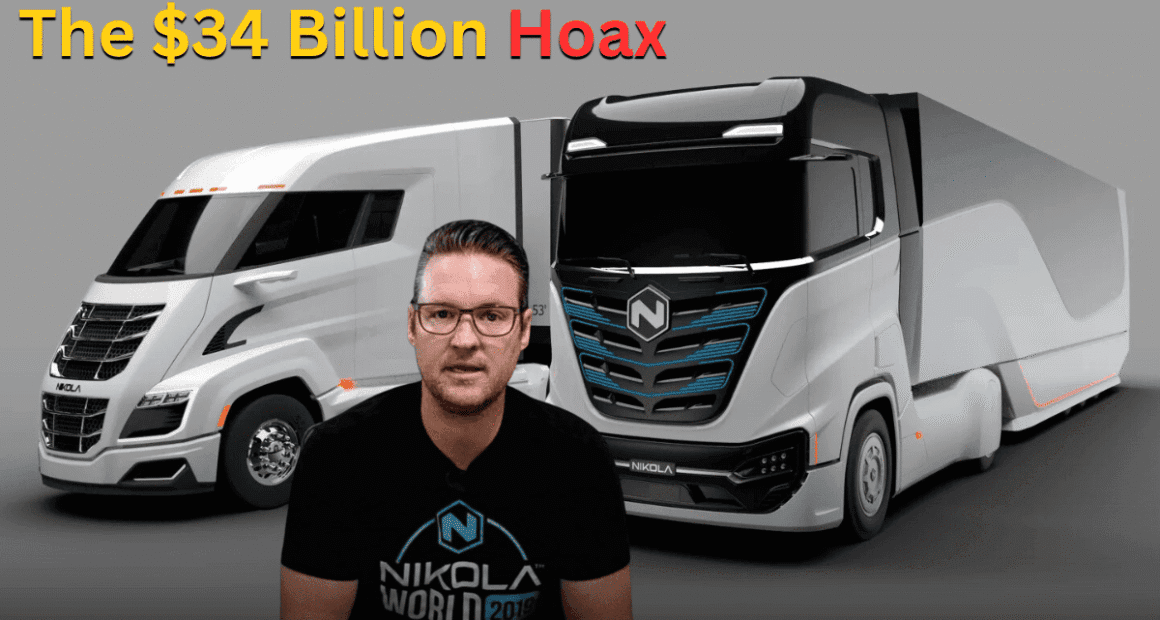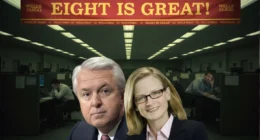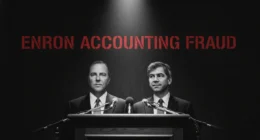The Truck That Couldn’t Move
December 2016. A sleek promotional video goes viral. A massive semi-truck glides silently down a desert highway. No engine roar. No exhaust fumes. Just pure, clean hydrogen power.
The company behind it? Nikola Motors. The founder? Trevor Milton, a charismatic entrepreneur who promised to revolutionize trucking. The valuation? Eventually, $34 billion.
But here’s what viewers didn’t know: The truck in that video had no engine. Moreover, it had no hydrogen fuel cells. In fact, it had no power system at all.
Instead, the truck was simply rolling downhill.
This is the story of Nikola Motors’ fraud. A tale of fake technology, manipulated investors, and one of the most brazen stock scams in modern history. Consequently, it ended with a CEO facing prison and billions in investor losses.
Let’s investigate how the deception unfolded.
The Birth of a Billion-Dollar Lie
First, Trevor Milton founded Nikola Motors in 2015. He named it after Nikola Tesla, hoping to capture that same innovative magic. His pitch was simple yet powerful: hydrogen-powered semi-trucks that would transform transportation.
Initially, the timing seemed perfect. Tesla was proving that electric vehicles could succeed. Meanwhile, investors were hungry for the “next Tesla.” Additionally, environmental concerns were rising. Therefore, clean energy transportation looked like the future.
Milton promised revolutionary technology. Specifically, he claimed Nikola had developed proprietary hydrogen fuel cells. Moreover, he said they had breakthrough battery systems. Furthermore, he announced partnerships with major manufacturers.
However, none of it was true.

Building the Illusion
In 2016, Nikola unveiled the Nikola One. This was supposedly their flagship hydrogen-electric semi-truck. The launch event was spectacular. Bright lights, loud music, and a truck that looked genuinely impressive.
But here’s what happened behind the scenes: The truck was a shell. Indeed, it had no functioning drivetrain. Certainly, it had no hydrogen system. Instead, it was basically an expensive movie prop.
Nevertheless, the deception worked perfectly. Media outlets praised the innovation. Investors lined up with checkbooks open. Soon after, celebrities and business leaders endorsed the company.
Meanwhile, Milton posted constantly on social media. He showed factory tours. He displayed prototype parts. He announced production timelines. Each post generated more hype. Consequently, each claim brought more investment dollars.
The Famous Downhill Video
Then came January 2018. Nikola released a video titled “Nikola One in Motion.” The footage showed the semi-truck cruising smoothly along a road. No driver visible. No sound. Just seemingly effortless movement.
The video went viral. It accumulated millions of views. Investors saw proof that the technology worked. As a result, valuations soared.
But investigators later discovered the truth: The truck was rolling downhill on a slight grade. In fact, they had towed it to the top of a hill. Then, they simply released the brakes and filmed it coasting down.
There was no power. No fuel cells. No revolutionary technology. Just gravity and deception.
Moreover, internal emails later revealed that employees knew it was fake. They called it “the rolling chassis.” Nevertheless, Milton presented it as a functioning prototype.

The SPAC Merger Gold Rush
By 2020, Nikola needed to go public. However, a traditional IPO would require extensive SEC scrutiny. Financial audits would expose problems. Technology verification would reveal the fraud.
So instead, Milton chose a different path: a SPAC merger.
SPACs (Special Purpose Acquisition Companies) offer a backdoor to public markets. Essentially, they avoid traditional IPO requirements. Consequently, companies face less regulatory scrutiny. Therefore, they became the perfect vehicle for questionable businesses.
In June 2020, Nikola completed its SPAC merger. Initially, the stock price exploded. Within days, the company reached a $34 billion market cap. Incredibly, this exceeded Ford’s valuation at the time.
Yet Nikola had produced exactly zero trucks. Furthermore, they had generated zero revenue. Still, investors bought the dream. After all, Milton’s promises sounded too good to ignore.
The Cracks Begin to Show
However, skeptics started asking questions. First, short-sellers began investigating. They requested factory tours. Additionally, they analyzed technical specifications. Moreover, they interviewed former employees.
What they found was alarming. For instance, the “production facilities” were mostly empty. The “manufacturing partnerships” were preliminary discussions at best. Meanwhile, the “proprietary technology” didn’t exist.
Then, in September 2020, everything collapsed.
Hindenburg Research Drops the Bomb
On September 10, 2020, Hindenburg Research published a devastating report. The title: “Nikola: How to Parlay An Ocean of Lies Into a Partnership With the Largest Auto OEM in America.”
The report was brutal. Specifically, it detailed years of deception. For example:
Fake Technology Claims:
- Nikola claimed proprietary fuel cell technology
- Actually, they had purchased components from third parties
- No breakthrough innovations existed
The Rolling Truck Video:
- Investigators confirmed the downhill deception
- Nikola admitted the truck “was not propelled by its own power”
- Yet they had presented it as functional
False Partnership Claims:
- Milton claimed major deals with manufacturers
- In reality, most were just preliminary talks
- Some companies denied the partnerships entirely
Facility Deceptions:
- Photos of “production lines” were staged
- Equipment was rented for photo shoots
- Actual manufacturing capability was minimal
Consequently, the stock crashed 25% in two days.

Trevor Milton Resigns
Just 11 days after the Hindenburg report, Trevor Milton resigned as executive chairman. The company issued a brief statement. They claimed it was voluntary. However, the timing told the real story.
Meanwhile, investors panicked. The stock continued falling. Within weeks, Nikola lost over $20 billion in market value. Thousands of retail investors watched their portfolios evaporate.
But the legal consequences were just beginning.
The SEC and DOJ Investigations
Soon after, federal investigators launched probes. The Securities and Exchange Commission opened a fraud investigation. Additionally, the Department of Justice began a criminal inquiry.
Investigators interviewed dozens of former employees. They subpoenaed internal documents. Moreover, they analyzed every public statement Milton had made. The evidence of fraud was overwhelming.
In July 2021, the SEC filed civil fraud charges against Trevor Milton. Specifically, they accused him of making false and misleading statements. The charges included:
- Lying about Nikola’s technological capabilities
- Misrepresenting production timelines
- Deceiving investors about partnerships
- Manipulating the stock price through social media
Then, in July 2021, federal prosecutors filed criminal charges. Milton faced three counts of fraud. Each carried a potential 25-year prison sentence.
The Trial and Conviction
The criminal trial began in September 2022. For weeks, prosecutors presented damning evidence. Former employees testified about the deceptions. Internal emails revealed deliberate fraud. Video evidence showed the staged demonstrations.
Milton’s defense argued he was an optimistic entrepreneur, not a criminal. They claimed he believed in the technology. Furthermore, they said startup exaggeration is normal.
However, the jury disagreed.
On October 14, 2022, Trevor Milton was convicted on three counts of fraud. Specifically:
- Securities fraud
- Wire fraud (two counts)
The verdict was clear: This wasn’t optimism. Instead, it was calculated deception.
In December 2023, Milton was sentenced to four years in federal prison. Additionally, he was ordered to pay $1 million in fines. Moreover, he faced three years of supervised release after prison.
The Investor Devastation
Meanwhile, investors suffered catastrophic losses. Retail investors lost billions. Pension funds saw massive write-downs. Even sophisticated investors got fooled.
Consider these numbers:
- Peak market cap: $34 billion
- Current value: Under $200 million
- Total investor losses: Over $30 billion
- Individual victims: Tens of thousands
Many investors lost life savings. Some had bought at the peak, believing Milton’s promises. Others had held through the crash, hoping for recovery. Few recovered more than pennies on the dollar.
Class action lawsuits followed. However, most investors will never recover their losses. The money is simply gone.

What Happened to Nikola?
Surprisingly, Nikola Motors still exists. After Milton’s departure, new leadership attempted damage control. They brought in automotive veterans. Additionally, they secured new funding. Moreover, they actually began producing some trucks.
However, the company never recovered its credibility. Production remains minimal. Revenue is tiny. The stock trades at a fraction of its peak price.
Meanwhile, the “revolutionary” hydrogen technology never materialized. Instead, Nikola now focuses on battery-electric trucks. Ironically, they’re doing what everyone else does.
The Broader SPAC Fraud Problem
The Nikola Motors fraud exposed a larger issue: SPAC abuse. In 2020-2021, hundreds of companies went public via SPACs. Many made extravagant promises. Few delivered results.
As a result, the SEC tightened SPAC regulations. They increased disclosure requirements. Additionally, they enhanced liability for misleading projections. Furthermore, they launched investigations into numerous SPAC deals.
Nevertheless, billions in investor wealth had already vanished. The regulatory response came too late for Nikola victims.
Red Flags Everyone Missed
Looking back, the warning signs were everywhere. Here’s what investors should have noticed:
Red Flag 1: No Revenue, Massive Valuation
- Zero trucks produced
- Zero dollars in sales
- Yet valued higher than Ford
Red Flag 2: Celebrity CEO with No Technical Background
- Milton had no engineering degree
- No previous automotive experience
- Just marketing skills and confidence
Red Flag 3: Resistance to Verification
- No independent testing allowed
- Factory tours were staged
- Technical details remained vague
Red Flag 4: SPAC Merger Instead of Traditional IPO
- Avoided SEC scrutiny
- No traditional due diligence
- Red flag for any company
Red Flag 5: Too Good to Be True Claims
- Revolutionary technology with no proof
- Promises that violated physics
- Impossible timelines
Red Flag 6: Social Media Hype Machine
- Constant Twitter promotion
- Attacking skeptics aggressively
- Creating FOMO (fear of missing out)
Lessons for Investors
The Nikola Motors fraud teaches critical lessons:
Lesson 1: Verify Technology Claims. Always demand independent verification. Don’t trust promotional videos. Instead, require third-party testing results.
Lesson 2: Be Wary of SPACs. SPAC mergers often hide problems. Consequently, they deserve extra scrutiny. Additionally, they frequently involve inflated projections.
Lesson 3: Check Leadership Credentials. Does the CEO have relevant experience? Can they explain the technology? Do they welcome tough questions?
Lesson 4: Watch for Hype Over Substance Legitimate companies focus on products, not promotion. Meanwhile, fraudulent companies do the opposite.
Lesson 5: If It Sounds Impossible, It Probably Is. Revolutionary breakthroughs are rare. Moreover, they require proof. Therefore, demand evidence before investing.
Where Trevor Milton Is Now
As of 2024, Trevor Milton is serving his four-year sentence at a federal prison. He maintains his innocence. Nevertheless, appeals have been rejected.
Meanwhile, his personal fortune has evaporated. Once worth over $1 billion on paper, he now faces financial ruin. Additionally, he faces numerous civil lawsuits. These will likely continue for years.
His legacy? A cautionary tale. Moreover, a reminder that fraud eventually gets exposed. Furthermore, a warning that no amount of charisma can replace actual technology.
The Aftermath and Impact
The Nikola Motors fraud had lasting consequences:
For Investors:
- Billions lost permanently
- Trust in EV startups is damaged
- Increased skepticism toward new technology
For Regulators:
- Enhanced SPAC oversight
- Stricter fraud enforcement
- Better investor protection rules
For the Industry:
- Legitimate hydrogen companies face more scrutiny
- Funding became harder for real innovators
- The “next Tesla” hype cycle ended
For Society:
- Important reminder about investment fraud
- An example of how easy manipulation can be
- Warning about social media’s power
The Final Warning
Today, new companies emerge constantly. They promise revolutionary technology. They seek billions in investment. Some are legitimate. Many are not.
The Nikola Motors fraud shows how easily deception works. A charismatic founder, a compelling story, and slick marketing can fool almost anyone. Even sophisticated investors fell for Milton’s lies.
But here’s the critical point: The warning signs were always there. Skeptics identified them early. Short-sellers exposed the fraud. Yet millions of investors ignored the evidence.
Why? Because they wanted to believe. They feared missing the next big thing. Consequently, they suspended critical thinking.
Don’t make that mistake.
When someone promises revolutionary technology, demand proof. When a CEO attacks skeptics, ask why. When a company avoids scrutiny, walk away.
Because the next Nikola Motors fraud is already forming. Right now, somewhere, another Trevor Milton is crafting another beautiful lie. Another promotional video is being filmed. Another SPAC merger is being planned.
Will you be the next victim? Or will you remember the truck that rolled downhill and the billions that vanished?
The choice is yours.
But remember: In investing, gravity always wins eventually. And trucks without engines don’t really drive.
No matter how good the video looks.
Citations
Hindenburg Research Nikola Report
Nikola admits prototype was rolling downhill in promo video
SEC Charges Founder of Nikola Corp. With Fraud
Nikola founder Trevor Milton convicted of fraud in NYC
Nikola founder Trevor Milton sentenced to four years in prison for fraud
Related Posts









